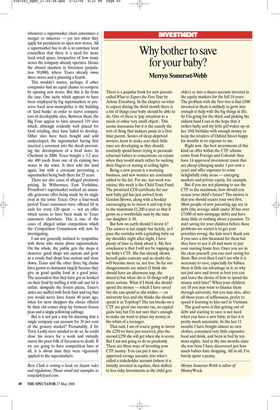Why bother to save for your baby?
Merryn Somerset-Webb
There is a popular book for new parents called What to Expect the First Year by Arlene Eisenberg. In the chapter on what to expect during the third month there is a list of things your baby should be able to do. One of these is ‘pay attention to a raisin or other very small object’. This seems innocuous but it is the exactly the sort of thing that induces panic in a firsttime parent. Scores of sleep-deprived novices, keen to make sure their little ones are developing as they should, routinely spend hours trying to persuade reluctant babies to concentrate on raisins when they would much rather be sucking their fingers or staring at ceiling lights.
Being a new parent is a worrying business, and new worries are constantly added to the list. For me, last week was raisins; this week is the Child Trust Fund. The promised £250 certificate for our new baby girl has just arrived from Gordon Brown, along with a booklet encouraging us to invest it and top it up to the maximum £1,200 a year so that it grows to a worthwhile sum by the time our daughter is 18.
But how on earth should I invest it? The answer is not simple but luckily, as I pace the corridor with a grizzling baby on my shoulder night after night, I have plenty of time to think about it. My first conclusion is that I will not be topping up my baby’s CTF. She has already shown herself quite contrary and no doubt she will become more so, not less. So far our disagreements are minor (I think she should have an afternoon nap, she doesn’t) but when she is 18 things will get more serious. What if I think she should spend the money — which I have saved but she can spend as she wishes — on university fees and she thinks she should spend it at Topshop? The tax breaks on a CTF are great (no income tax, no capital gains tax) but I’m not sure that’s enough to make me want to place my money at the whim of a teenager.
That said, I am of course going to invest the £250 we have just received, plus the second £250 she will get when she is seven. But I am not going to do so prudently. There are three ways of investing your CTF money. You can put it into an approved savings account, into what’s called a stakeholder account (where it is initially invested in equities, then shifted to less risky investments as the child gets older) or into a shares account invested in the equity markets for the full 18 years. The problem with the first two is that £500 invested in them is unlikely to grow into enough to help with the big things in life. So I’m going for the third, and picking the riskiest fund I can in the hope that it strikes lucky and my little girl wakes up on her 18th birthday with enough money to keep the retailers of Oxford Street happy for months at no expense to me.
Right now, the best investments of this kind on offer within the CTF scheme come from Foreign and Colonial: they have 14 approved investment trusts that are cheap (charging under 1 per cent a year) and offer exposure to some delightfully risky areas — emerging markets and private equity, for example.
But if you are not planning to use the CTF to the maximum, how should you secure your child’s future? The answer is that you should secure your own first. Most people of new parenting age are in debt (the average adult under 30 has over £7,000 of non-mortgage debt) and have done little or nothing about a pension. To start saving for your children before these problems are sorted is to get your priorities wrong: the kids won’t thank you if you save a few thousand for them but they have to use it all and more to pay your nursing home fees. Once you are in the clear yourself, you can start saving for them. But even then I can’t see why it is necessary to save, especially for babies: there is little tax advantage in it, so why not just save and invest as best you can and leave the choice of how to spend the money until later? When your children are 18 you may want to finance them through university, but you may also, after all those years of selflessness, prefer to spend it learning to kite-surf in Vietnam.
The good news is that getting out of debt and starting to save is not hard when you have a new baby; in fact it is pretty much automatic. In the last 11 months I have bought almost no new clothes, consumed very little expensive food and drink, and been in bed by ten most nights. And in the two months since she was born I have discovered just how much babies hate shopping. All in all, I’ve barely spent a penny.
Merryn Somerset-Webb is editor of MoneyWeek.










































































































 Previous page
Previous page